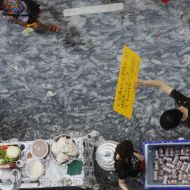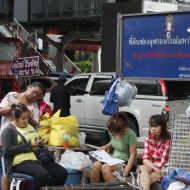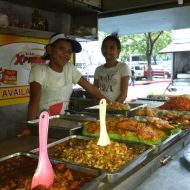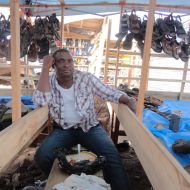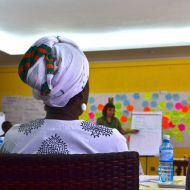iPhone Hustlers Provide a Last-Mile Solution for a Global Market
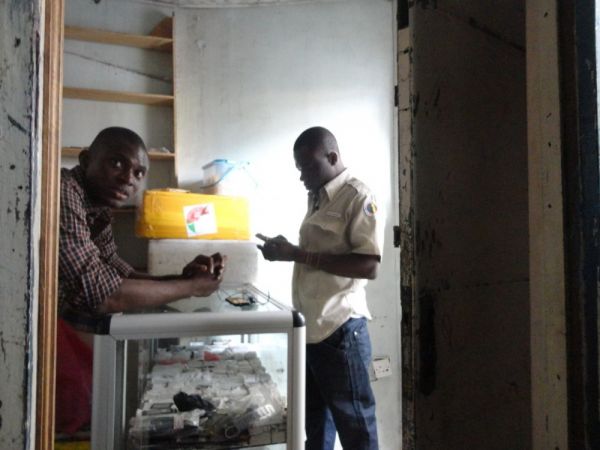
Morgan in his shop on Tip Toe Lane.
Chris Oppong-Agyemang’s landlady is called “Tip Toe Mama,” and for good reason. Her family owns the land where the Red Tip Toe House stands, and supposedly, it is this house that gave Tip Toe Lane its memorable name. Just a decade ago, the street was an entertainment district, I’m told. Now, though, Tip Toe Lane is shorthand for the long row of shops at Kwame Nkrumah Circle where you can go for deals in buying, selling and repairing electronics.
It’s a colorful place. There’s a comedian who also repairs phones. A Nigerian restauranteur. A man who sells phone accessories at one of his shops and cuts hair at the other. There’s always a lot of action on Tip Toe Lane. The last time I was there, I encountered an exuberant parade of young men dressed in mourning clothes drumming and dancing and taking up collections for a funeral. This time, two street performers painted in the colors of the two major political parties, NDC and NPP, were striding around together posing for pictures. “We Want Peace” was written across their chests, an effort to calm potential tension surrounding the forthcoming ruling on the legal battle between the two parties over the legitimacy of last year’s presidential election.
Entering Tip Toe Lane from the New Town side, you run a gauntlet of immaculate glass cases filled with new phones and knock-offs. Then, the signs appear. Electronics dealers advertise from all sides, from shops inside the buildings as well as tiny stalls and display cases that crowd the pedestrian-dominated road. Entering from the Circle side, there are young men lined up hawking iPhones, Samsungs and HTCs. Some are real, mostly imported by businessmen who bring them from Dubai and China, and some are impressive Chinese-made fakes, says Chris. We are sitting in the shop of the sharp and articulate young Nigerian businessman, Morgan, who recently sold me a camera and whose tales of Tip Toe Lane intrigued me enough to bring me back.
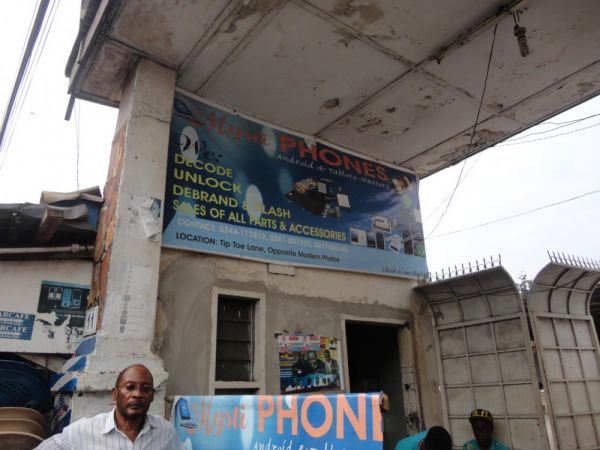
The exterior of Morgan’s shop, the point-of-sale for a trillion-dollar global industry.
Chris is one of Morgan’s business partners. He repairs phones. “All kinds of phones,” he tells me. He has a USB-to-micro-USB cord around his neck like a necklace, an accessory of his trade. “I’m working here with my brother,” he tells me, looking over at Morgan. (Who is not, of course, his blood brother; Chris is an Ashanti man from Kumasi while Morgan is a Yoruba from Nigeria.) “I’ve been two years at this shop,” Chris says. In Kumasi, he repaired phones in other people’s shops. “I came down to Accra to see how things would go.” He worked for someone else for a while, but decided he wanted to try and make it on his own, selling parts and doing repairs. He had a tiny space he rented on the pavement in another part of Circle, until he got this shop and teamed up with Morgan.
“This is a repairer and a comedian!” Morgan interjects as a slight young man whose hair is shaped into a faux-hawk walks in. “If you want to find me, just ask for MC Mosquito,” says the comedian. Clement is MC Mosquito’s given name, and he’s also from Nigeria. He pulls out a comedy DVD he’s just produced. He performs a couple of times a week at nearby Vienna City nightclub. He really wants to do it full-time, but for now, he earns money repairing phones. He saw more opportunity and less competition in both of his professional fields in Ghana than in Nigeria, so he came here nine months ago. Mosquito and Chris are both able to repair hardware issues with all kinds of phones. In addition to professional training and apprenticeships, they’re self-taught from the internet. Mosquito says he generally repairs 10 to 15 phones each day, which he’s been doing for more than five years. “That’s a lot of phones,” I say. I turn to Chris. “So, who’s faster, you or Mosquito?” Chris laughs and says, “Mosquito, you and me, which faster fix up phones? I’m extra faster.”
Morgan hands Mosquito a small Nokia, which he opens up and attacks with a screwdriver as Chris and I resume our conversation.

Tip Toe Lane is known for its colorful characters.
Chris usually charges 10 Ghana cedis for a basic repair, like replacing the pin in the ear or mouthpiece. “Original” phones – name brands like Samsung, iPhone, or HTC – and upscale Chinese touchscreen phones are repaired at higher rates, starting at 20 Ghana cedis. He and his business partners also travel to Nigeria, which has lower customs duties on electronic imports from China. The expenses are around 300 Ghana cedis roundtrip. They sell each part at a two to five cedi markup and sell about 10 to 20 pieces a day. If they had more capital, though, they could make more, Chris says. They can’t afford to import all the different parts people regularly ask for. To bring in all the different parts they’d like to import would require about 15,000 Ghana cedis in startup capital.
A 32-year-old Togolese man, Chiido, comes in to talk to Morgan, who convinces him to talk to me. Chiido protests that he can only speak French — in nearly flawless English. He’s just made his first trip to China, to Guangzhou. He started working in Togo as a phone repairer, then he also came to Ghana because business is better here. He has a little space on the sidewalk that he rents from the land owner for 10 Ghana cedis a week, and there he sets up a stool to sit and repair phones. But he’s using his phone profits to fund his forays into trade, which is why he went to China with, he tells me, Morgan’s help.
There’s an art to this kind of business, says Joe Dontoh, who buys, sells and repairs netbooks, laptops and computer accessories. Most of the computers he purchases are secondhand, as are most of the others you find on Tip Toe Lane. “It’s a risk,” he says. “You buy a laptop from people and others say it’s stolen. You can be arrested by the police. [They] don’t require proof.”
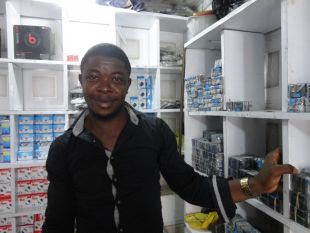
Emeka Ani, who owns three shops on this street.
So, he says, he’s learned how to tell when someone can’t be trusted. One way is knowing a deal that’s too good to be true. “There’s a saying we have here: kpa lo, which means something like cheap. Very cheap.” He gives me an example of someone bringing in a MacBook to sell for 500 Ghana cedis ($250 USD) and not even knowing how to operate it. “You have to differentiate. Our job here is 50-50. You gain, you lose,” he says. “It’s a good business. It’s only that you abide by the rules and regulations. You have to be careful. I’m not a greenhorn. I’m not a fresher. There are some laptops, your instincts will tell you, don’t buy it.”
Joe pauses to take a phone call. I listen while he converses in a mixture of English, Pidgin and Twi: “The guy sell am? For what?”… “Oh, massa, massa! Forget it.”… “What be the screen size?”
“Business will be good when you play your cedis well,” Joe resumes. He takes another call as we finish talking. “You go give me 70 percent down,” he says to the caller, in a playful tone. “You can even pay all!”
All businessmen, of course, have their philosophies. Joe’s is about sociability and discernment. Emeka Ani has a rather more reserved philosophy. “If you know life,” he tells me, “you know you cannot speak for yourself.” Emeka has three small shops in Tip Toe Lane, where he sells Chinese-made accessories imported through Nigeria. He travels to his home country every two weeks, importing around 6,000 to 7,000 Ghana cedis ($3,000 to $3,500) worth of electronics, which he sells wholesale. Far from the stereotype of the fast-talking Nigerian hustler, he speaks quietly and carefully, his tone only reinforcing his remarkable resemblance to the Nigerian novelist Chinua Achebe.
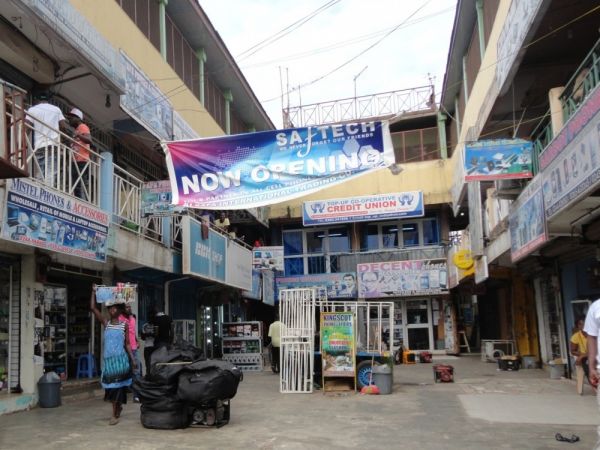
Electronics shops on Tip Toe Lane.
Emeka discovered the profitability of the Ghanaian market through friends of his on Facebook and Whatsapp. They told him that if he were to bring product here, “surely, surely it will move.” That was more than two years ago. Before he’d established himself, he used to sleep in a nearby mosque and leave his money with the imam for safekeeping. Inevitably he came to Tip Toe Lane. “Here is the center,” he says. “So everybody will land here.” He’s also considering doing business in smaller towns in Ghana, but found that only Accra would sustain the kind of wholesale business he wanted to run.
Now, Emeka says, he makes it a point to give some of his product at cost to young men who want to hustle. “If you don’t do it, and they see you have money, they will rise against you,” he says. “But if I have, and you have, there will be no problem… You’re my fellow youth.”
Because of this, he says, he is confident that the other businesspeople on Tip Toe Lane will have his back. “People around you,” says Emeka, “if you are good, they’ll say it about you. My grandmother told me this before she left: No matter how little you have, you should divide it.” This is a poignant re-stating of one of the common threads running through many African philosophies: Sharing and co-dependence. In Tip Toe Lane, despite the surface appearance of the supremacy of the hustle, I get the sense that the spirit of community runs deep, binding this odd collection of knock-off phone repairers, computer sellers and parts dealers.
Photos by Sharon Benzoni

